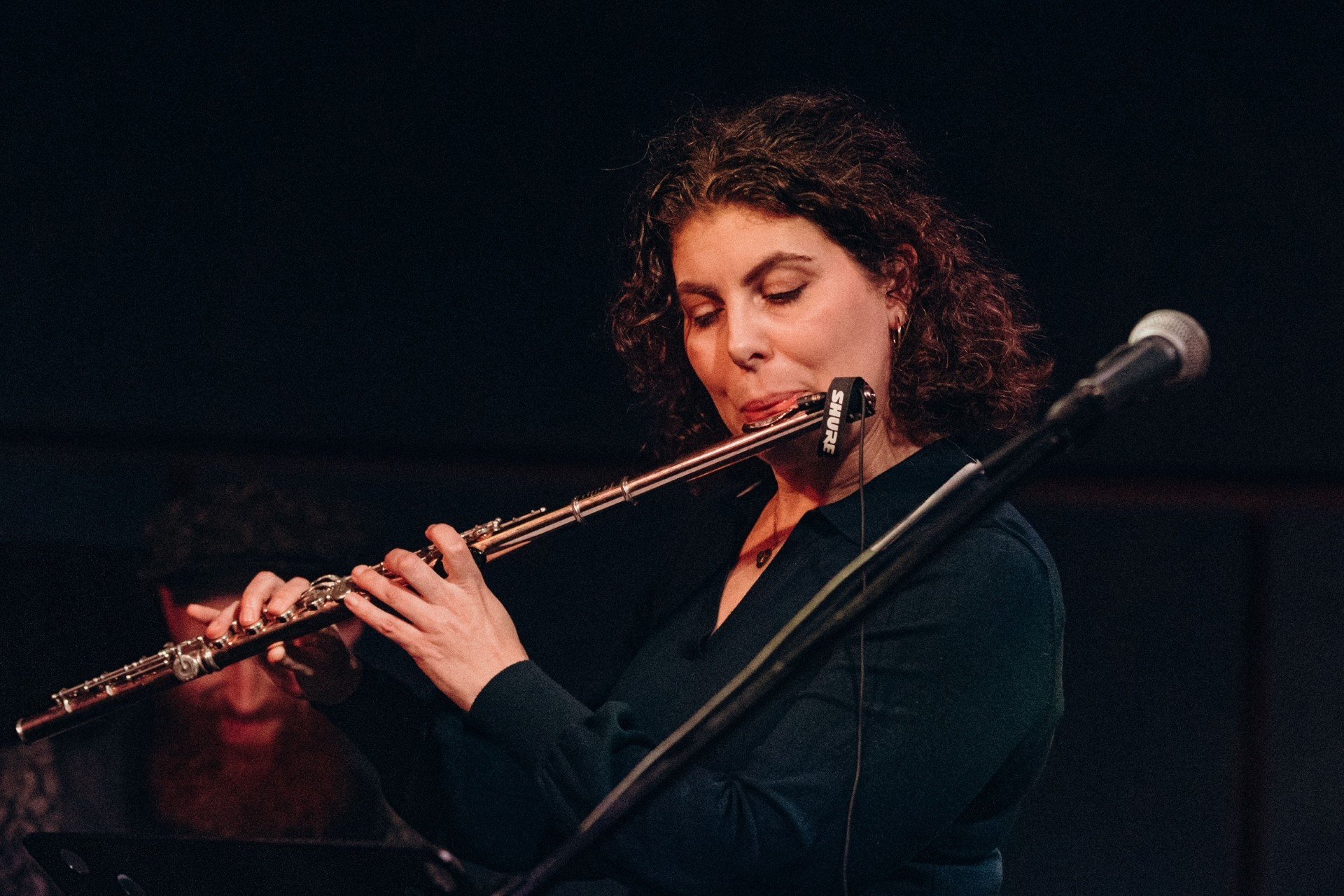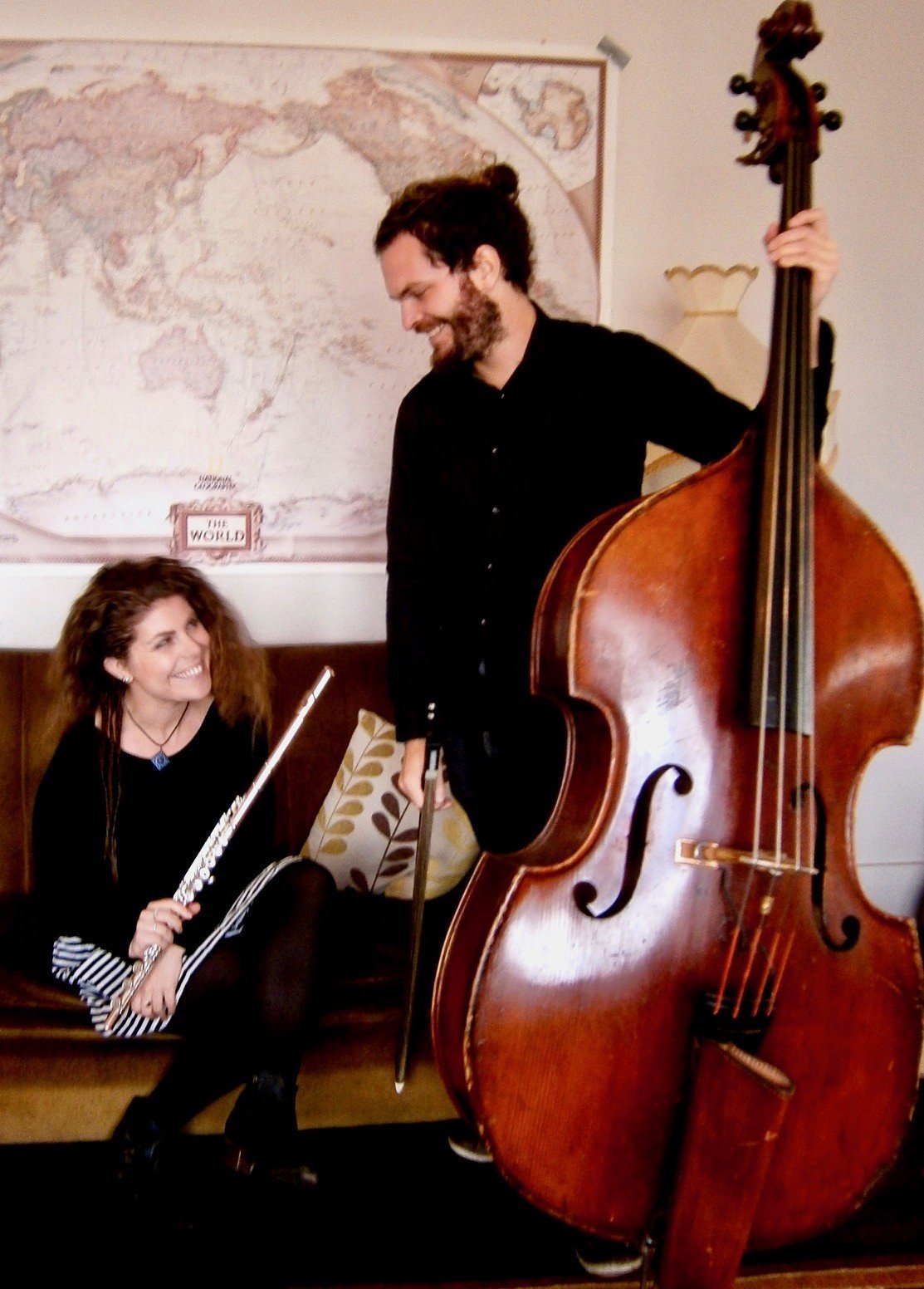
Music has proved to be an important outlet for flautist Rachelle Eastwood as she processes her grief at losing three grandparents reasonably close together.
When her first grandparent died during Covid-19, she turned to music to help her through, as composing felt like an extension of herself.
‘‘I get to kind of create my own palettes and kind of explore the colours myself and create my own stories.’’
It seemed natural to write music inspired by her grandparents. However, she did not want her remaining grandparent, Rita, to feel left out, so has recently composed a piece for her, too.
‘‘I’m going to basically have a suite of four pieces for my grandparents. The first one, especially, still makes me feel a little bit teary. ’’
The suite will be played in Dunedin for the first time with her brother, double bass player and Mozart Fellow Simon Eastwood, accompanying her (along with Dunedin musicians Bill Martin on piano and Carl Woodward on drums) and in front of her Dunedin-based parents.
‘‘It’s extra special that Simon can play it as well. It’ll be pretty cool to have Mum and Dad there.’’
It has been a long time since the siblings played publicly together — possibly as far back as youth orchestra days. Even when they lived together in Wellington during Covid, they only jammed a couple of times.
He has heard the first three pieces but has yet to hear the piece for Rita.
‘‘It’ll be really great to have him actually put his input in and I’ve always felt like when Simon and I like get together and jam, we have this extra kind of sixth sense of musicianship and sensibility because we know each other so well. So it’ll be really exciting to see how that kind of comes across in a live performance.’’
The Eastwoods spent part of their childhood in Dunedin and it is where many of their formative musical memories come from.
‘‘I know I was in Dunedin when Mum took us to an orchestra. I just saw the flute there and wanted to play that shiny instrument in the middle of the orchestra. And so ever since then, I was kind of set on flute.’’
At 5, she was a bit young to take it up, so had to settle for the recorder.
‘‘Bridget Douglas, the principal of the NZSO, actually lived across the road from us. At the time, she was going to high school back then, so I used to hear her practise as well.’’
Despite the delay, she was determined she was going to play the flute as soon as she was old enough, at 10.
‘‘I think the flute always seems to get the nice kind of pretty, like, frilly sort of bird-like ... flourishy stuff.’’
Hearing music played at home such as Peter and the Wolf, where the flute plays the role of the bird, and The Carnival of the Animals, in which the flute plays a solo imitating the sound of birds, reinforced her love of the instrument.
‘‘As I got older, I realised how versatile it really was and that it could do so much more than that.’’
Again the music played at home had an impact. The 1970s progressive rock her parents listened to helped her realise there were many different ways the flute could be played and sound — ‘‘all the extended techniques and different sounds you can get out of it’’.
She studied classical music at university at the encouragement of her mother, who believed she could always go back and study something different if she chose later on. Her parents’ support has seen all the family go into music in one way or another.
‘‘I think it’s exposure to the music at an early age and also just having parents who are supportive of us doing that rather than forcing us to do something else.’’

As part of her study and involvement in the Wellington Jazz Co-operative, she began composing.
‘‘It’s kind of just an extension of the journey of going from being a classical musician, where I felt like I was told what to do and just played the music that was given to me, to improvising and then composing, where I get to make the music that I want to make.’’
Doing so is not always easy.
‘‘Sometimes I find it really easy and it flows really straightforward and then sometimes I find it a bit of a struggle kind of getting all the bits to kind of fit together.’’
But it is all worth it when she brings a piece to be played by other musicians.
‘‘With jazz compositions, it’s always what the other musicians bring to it and it’s always really exciting to hear what the other musicians bring to something that you’ve written.
‘‘A lot of the time for me writing jazz compositions, you’re only coming up with sort of a place for a conversation to happen.
‘‘You’re creating the melody and the harmony but after that a whole bunch of things can spur off that you don’t expect which is really, really cool.’’
Eastwood, who recently moved to Brisbane, lived in Montreal for two years, further expanding her skills on the jazz flute and performing with well-known jazz flautists Bill McBirnie and Billy Kerr.
She has also spent time in Cuba, studying with Orlando ‘‘Maraca’’ Valle, and in New York.
In the early days of her career she realised she needed another outlet other than teaching to help pay the bills.
‘‘I had a lot of private students and I was teaching flute at girls’ schools, but I was just finding it was all a bit much really.
‘‘It’s quite intensive teaching one-on-one all day, every day and, at the end of the day, I didn’t really want to play flute for myself any more.’’
Whatever she did needed to be flexible and fit in with her passion for playing. When she was younger she had thought of being a physiotherapist, so decided to try out a massage therapy course to begin with.
‘‘It turns out I’m a bit of a geek with anatomy. Our parents are both doctors so I’m not sure if it’s growing up around them but I get really fascinated by all the muscles and how they move and biomechanics.’’
It turned out to be a great option for her and had enabled her to combine, performing, teaching and massage into a ‘‘portfolio career’’.
‘‘To a certain extent I can pick and choose how much of it I want to do. It’s just one of the realities of being a musician.’’
But she knows she has to perform regularly for her own mental health.
‘‘I think that’s quite important to me to be able to keep playing for other people and then the other two are kind of helping me survive in the meantime.’’
She is a firm believer in music being for sharing.
‘‘Having the energy from the audience, the interaction playing with probably just as much as that, is actually playing with the other musicians and getting the energy and the inspiration and the new kind of ideas from the other musicians as well.’’
Another bonus is that the massage also helps with understanding her own body and the physical pressures performing has on it. Musicians are often forced into positions for many hours that are not natural.
‘‘What I noticed was mostly, because I was going back to study jazz the second time around, musicians get a lot of pain and stuff when they’re playing. I could do a lot of practise and be like, oh, that neck kind of hurts and be like, it’s just that muscle, a trigger point or something in that muscle and I know if I do self-massage, I’ll sort myself out.’’
While a lot of music students are very afraid of things such as carpal tunnel and repetitive strain injury, Eastwood knows how to manage it and believes it is important for musicians to look after their bodies.












